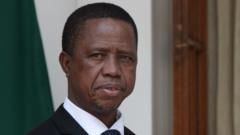Gridless, a Kenyan company, sets up energy-efficient bitcoin mines in Zengamina, fostering sustainable energy use while supporting local infrastructure.
**Bitcoin Mining: A Digital Cash Revolution in Rural Zambia**

**Bitcoin Mining: A Digital Cash Revolution in Rural Zambia**
In remote Zambia, bitcoin mining is flourishing with the help of hydroelectric power, transforming local communities and economies.
In the quiet yet dynamic environment of Zengamina, Zambia, bitcoin mining has found an unprecedented foothold. Amidst the breathtaking backdrop of the Zambezi River, the sound of the roaring water complements the high-pitched hum of advanced computers working around the clock to verify bitcoin transactions. Phillip Walton, an engineer from Gridless, a Kenyan firm, oversees a unique mining operation, where clean and affordable hydroelectric power facilitates a profitable bitcoin venture in a largely underserved community.
Strategically located near a hydroelectric power plant that harnesses the Zambezi's energy, Walton's bitcoin mines tap into the abundant, cost-effective electricity generated. "Our partnership with the power company has been transformative," Walton states, explaining how their operations at this mini-grid site not only ensure the economic viability of bitcoin mining but also significantly contribute to the hydro plant's overall revenue. This symbiotic relationship is essential, as the plant faced challenges meeting operational costs amidst low local power consumption.
The hydro plant, operational since 2007, plays a pivotal role in the community, providing electricity to around 15,000 residents. Local leaders like Daniel Rea, who manages the plant, highlight how the bitcoin mines have reinvigorated the facility's finances, allowing for reduced electricity costs for the residents. This newfound income has a profound impact on everyday life in Zengamina. Local entrepreneurs like Damian, who runs a barbershop, now enjoy the benefits of reliable power, spending their earnings to secure education for their families.
While the local community thrives, they remain largely indifferent to the opinions surrounding bitcoin mining. Simplistic daily life continues as children gather around community computers and families share limited electricity for essential needs. The impending expansion of the hydro plant to connect to the national grid could alter the economics of bitcoin mining. However, both Gridless and plant managers express optimism, viewing community support as paramount as they transition toward greater sustainability.
Looking ahead, Gridless has ambitious plans to establish its own hydro plants to further capitalize on the vast untapped energy potential across Africa. Co-founder Janet Maingi envisions a future where mining operations not only provide financial support but also directly empower local communities with reliable energy solutions. Nevertheless, challenges persist, including governmental resistance to cryptocurrency mining due to concerns over its energy-intensive nature and its potential ramifications on local energy markets.
As the bitcoin industry continues to evolve globally, including significant operations in the U.S. and Kazakhstan, Zengamina serves as an example of how a controversial sector can yield benefits beyond financial gain. Researchers from institutions such as Cambridge University note a pivotal shift towards sustainable energy practices, suggesting a potential balance between technological innovation and ecological responsibility. In remote areas like Zambia, the confluence of bitcoin mining and renewable energy might indeed represent the future of economic development.
Strategically located near a hydroelectric power plant that harnesses the Zambezi's energy, Walton's bitcoin mines tap into the abundant, cost-effective electricity generated. "Our partnership with the power company has been transformative," Walton states, explaining how their operations at this mini-grid site not only ensure the economic viability of bitcoin mining but also significantly contribute to the hydro plant's overall revenue. This symbiotic relationship is essential, as the plant faced challenges meeting operational costs amidst low local power consumption.
The hydro plant, operational since 2007, plays a pivotal role in the community, providing electricity to around 15,000 residents. Local leaders like Daniel Rea, who manages the plant, highlight how the bitcoin mines have reinvigorated the facility's finances, allowing for reduced electricity costs for the residents. This newfound income has a profound impact on everyday life in Zengamina. Local entrepreneurs like Damian, who runs a barbershop, now enjoy the benefits of reliable power, spending their earnings to secure education for their families.
While the local community thrives, they remain largely indifferent to the opinions surrounding bitcoin mining. Simplistic daily life continues as children gather around community computers and families share limited electricity for essential needs. The impending expansion of the hydro plant to connect to the national grid could alter the economics of bitcoin mining. However, both Gridless and plant managers express optimism, viewing community support as paramount as they transition toward greater sustainability.
Looking ahead, Gridless has ambitious plans to establish its own hydro plants to further capitalize on the vast untapped energy potential across Africa. Co-founder Janet Maingi envisions a future where mining operations not only provide financial support but also directly empower local communities with reliable energy solutions. Nevertheless, challenges persist, including governmental resistance to cryptocurrency mining due to concerns over its energy-intensive nature and its potential ramifications on local energy markets.
As the bitcoin industry continues to evolve globally, including significant operations in the U.S. and Kazakhstan, Zengamina serves as an example of how a controversial sector can yield benefits beyond financial gain. Researchers from institutions such as Cambridge University note a pivotal shift towards sustainable energy practices, suggesting a potential balance between technological innovation and ecological responsibility. In remote areas like Zambia, the confluence of bitcoin mining and renewable energy might indeed represent the future of economic development.






















